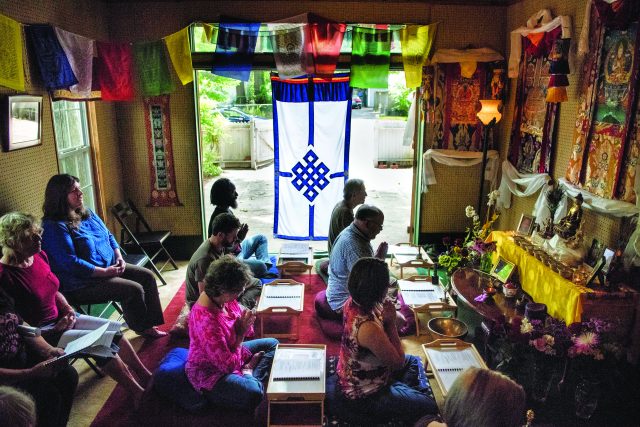The South Carolina Dharma Group survives on donated space and monthly dues. A small group in Columbia, the state’s capital, it has relied for guidance on the weekly visits of Geshe Topgyal, a Tibetan monk in the Dalai Lama’s lineage who heads up the Charleston Tibetan Society 100 miles away. In recent years, however, age and the demands of the Charleston center have caught up with Geshe Topgyal, so for the most part the Columbia group has been on its own, raising money from time to time to cover the travel and hosting costs for visiting teachers.
Sustaining such a small sangha hasn’t been easy, but the need for shared support in practice has inspired the South Carolina Dharma Group to persevere, according to Nancy Kreml, the group’s secretary: “We mutually help each other to try to follow and understand the teachings and keep up our practice,” she told Tricycle’s web editor, Wendy Joan Biddlecombe, who reports on the sangha on p. 24. Despite its meager resources, the group manages to meet each Sunday and also to reach out to prisons. Kreml herself visits inmates weekly in Columbia and monthly at a prison 90 miles away.

The South Carolina Dharma Group is just one of many small Buddhist communities across North America, Europe, Australia, Latin America, and other places where Buddhism has recently taken root. In recent issues, in our “Meet a Sangha” column, we’ve begun to visit some of them to get a sense of how they’re doing. In a culture alien to dharma, it’s easy to feel that the wind is not at one’s back. So it is all the more impressive that such groups survive, even thrive, despite the challenges of keeping any community afloat, let alone one devoted to the teachings of the Buddha.
Not all sanghas operate on a shoestring, of course. It seems every year now a thriving community or Buddhist institution celebrates its multi-decade mark—30-, 40-, even 50-year anniversaries are not unheard of. Often, and rightly, we celebrate their founders, whose foresight and fortitude have built sustainable practice communities against the thrust of a highly materialistic culture. Yet often overlooked is what it takes to establish these very teachers: the devoted practitioners who have supported them, and sometimes challenged them, over decades. This is something that is easy to miss, especially in such an individualized culture as our own. But it is the very energy and commitment of groups like the one in South Carolina that have made the transplantation of Buddhism to this country possible, from the early Buddhist immigrants to non-heritage Buddhists who followed in their wake.
It is good to recognize and honor founders and those of great accomplishment. Considered from one angle, there is much to be said about those who create great possibilities. From another, if we expand the frame, we see the fabric of relationships and dedicated effort that such people rest on. And we should honor founders not only because of what they’ve done but also because they represent the good work we’ve all participated in.